- Home
- Russell Blake
Sahara Page 2
Sahara Read online
Page 2
“Before I forget, this is for you, Mounir,” one of the new arrivals muttered, and handed him a USB thumb drive. “He instructed us to give it to you once he was free. Said you would know what to do with it.”
Mounir smiled, revealing yellowed teeth. “Let me take a quick look at it, and then we shall enjoy some hot tea and discuss what is to come.” He called out down the hall. “Salma! We have visitors. Make a pot of tea, and be quick about it!”
“Yes, Mounir,” a woman’s voice answered.
“This way,” Mounir said to the newcomers, indicating a room at the end of the hall. “I’ll just be a few minutes.”
The guests sat on the floor, where a number of carpets lay to soften the hard stone, and set their rifles aside while Mounir padded to another room to examine the contents of the thumb drive. He was gone for five minutes, and when he returned, his eyes were bright with excitement. He offered a reptilian grin and sat across from them, his expression animated.
“He is a genius. There can be no doubt. His plan will bring the infidels and their devil master to their knees. It is all that we have been waiting for, and more.”
“What can you tell us about it?”
Mounir thought for a moment. “Our enemies will be dealt a death blow that will strike fear through the hearts of all who support Israel. Soon we will take control of Libya, which will be just the beginning. Once we do, no one will be safe from our wrath – nothing that they do, no preparations or safeguards, will help them. It will completely change the balance of power, and all of the cursed bitch’s allies will desert her when it becomes obvious that she is going to pay the ultimate price.”
“But how?”
“A biological agent developed in a former satellite of the Soviet Union. Weaponized by the Chinese after the wall came down, and more lethal than anything seen before. Enough of it to destroy those who willingly help our enemy, because they can never be sure when the next attack will be mounted or from what direction it will come.”
The men’s eyes widened. “He has secured this agent?”
Mounir frowned and yelled toward the kitchen, “Damn it, woman. I said prepare tea and a plate of food for our guests. Where are you?”
“I’m sorry. I’ll be right there,” Salma said. A metal pan rattled on a counter, and Mounir shook his head.
“You see what I put up with? Allah tests us all in His own way.”
The men laughed, and a slim woman wearing a floor-length robe and a hijab and niqab that covered her face and hair entered carrying a tray with an antique tea set on it and two baskets of rolls and dates. She knelt with practiced skill and placed the tray before Mounir, and then straightened and backed away with her eyes averted. Nobody said anything until she’d retreated into the kitchen, and then Mounir made a show of pouring his guests tea and offering them the meager bounty of his larder.
Salma listened as the men joked in the living area, and when she was sure they were distracted by one of her husband’s rambling stories, slipped from the kitchen and skirted the exterior of the house until she arrived at the window of the room that served as his office. She slid it open and climbed through into the darkened chamber, and moved quickly to where a computer’s green power light glowed in the corner.
Salma tapped a few keys, and the screen blinked to life. The USB drive the visitors had brought was still in the socket, and she scanned the contents of the directory before removing a thumb drive of her own from within the recesses of her robe and inserting it into an adjacent socket. She quickly skimmed the main document and then tapped more commands, copying the original to hers in under a minute while she continued to read. The drive blinked off and she retrieved it, listening intently to confirm that the men were still deep in discussion and oblivious to her actions.
When she didn’t hear anything to alarm her, she returned to the window and climbed out into the arid night. The information she’d copied was too sensitive to delay by trying to keep up appearances, and she needed to leave immediately, while she could. With Mounir being as unpredictable as he was, she couldn’t assume that they wouldn’t be uprooted with the morning light to travel to some even more remote berg, where she’d never have the opportunity to escape him.
No, the years of waiting, choking down nausea and bile as the filthy swine had taken her whenever he felt like it, pretending to love a man who smelled like a goat and had the grace of a boar, had finally come to an end, and she would be free once again.
Assuming she could make it to safety in a country ravaged by war and destruction.
She’d been preparing for this day for some time, and had taken extra precautions when she’d overheard him on a phone call discussing the escape of one of his fellow scum from prison. Mounir’s attitude had changed after that call; she’d sensed a quickening in his feverish plotting, and the meetings with other terrorists became more frequent, until this nocturnal visitation had closed the circle and given her what she needed.
Salma retraced her steps to the kitchen and jotted out a suicide note that she’d recited in her sleep for many nights while dreaming of finally leaving, never to return. She explained that she was despondent at being unable to conceive a child, was depressed at the misery that was her life, and had decided to end it all by throwing herself into one of the deep ravines in the nearby foothills rather than suffering further humiliation. She signed it with a flourish and allowed herself a trace of a smile, and then set it on the tile counter and slipped out the door again, a kitchen knife in hand in case anyone tried to accost her.
Salma moved silently to the street and then took off at a run. She’d secreted a backpack with clothes, money, and a satellite phone in the hills outside town. She would fake her death, leaving her torn veil near one of the more treacherous ravines, and end the trail there. Whether or not Mounir believed that she’d killed herself, his ego would never allow him to admit that his wife might have left him, and he would be likely to go along with the story she’d laid out rather than concede to the world that she’d despised him.
If things worked out the way she’d planned, she would have bought herself enough time to escape for good, and her first act of freedom would be to send a text to a number she’d memorized years before but had never dared write down, and then head north to where she could get clear of the cursed desert nation before its filthy denizens were the death of her.
Chapter 3
Tel Aviv, Israel
Moonlight illuminated the street as Jet crept forward. She stayed to the shadows, her black clothes and knit ski cap rendering her close to invisible, so that her movement along the sidewalk was almost imperceptible in the gloom. Her footsteps were nearly silent, her rubber soles placed with precision as she made her way toward a tenement that loomed over her like a sentry, its windows dark, the façade covered with graffiti. Beneath the cap, her face was obscured with black base so it didn’t reflect any light, and her gloved hand clutched a suppressed pistol.
She paused at the base of the building and looked up at the roof three stories above. Rather than making for the entrance, Jet circled to a tree and pulled herself into the branches, and when she was eight feet from the base of the façade’s iron fire escape, slipped her weapon into her belt and waited, listening.
An airliner on takeoff from the nearby airport shattered the night, and Jet used the cover of its engines to mask any sound she’d make on the fire escape. She took a deep breath, gauged the distance a final time, and threw herself into space, arms outstretched.
Her hands locked on the edge of the platform, and she heaved herself up with a barely audible grunt, her daily syllabus of hundreds of pull-ups and push-ups serving her well. The noise of the plane faded, but not before she’d mounted the steps and was peering over the roof lip.
A figure huddled on the far side, where the menacing snout of a sniper rifle protruded from beneath a black tarp that concealed shooter and weapon. Jet hoisted herself the rest of the way onto the roof and crossed to where the g
unman was positioned in eight fluid steps, her pistol in hand.
“Bang. You’re dead,” she said, weapon pointed at the figure.
A curse in Hebrew greeted her announcement, and the sniper tossed the tarp aside and scowled up at Jet. “How the hell–”
“You left yourself wide open. If this were a real operation, you’d be history.”
“I booby-trapped the stairs. Motion detectors on the ground floor. I did everything by the book.”
“Maybe you need a new book. You didn’t secure your perimeter.” She explained how she’d used the tree to reach the fire escape, and the young man’s eyes widened.
“Yeah, but how often will that happen in real life?” he blurted.
She frowned and looked him over. “To you? Only once. Then you’ll decompose into something useful.” Her voice hardened. “Your job, if you’re going to survive, is to expect the unexpected. To develop hyper-alertness and take nothing for granted. Any pro would have expected you to have taken countermeasures, so they’d have been useless against anyone but a rank amateur or a beat cop.”
“You knew I was up here,” he argued.
“Just like if something goes wrong on an assignment, those hunting you can be assumed to know where you’re going to take your shot from.” She sighed. “I’m not here to argue with you. I’m supposed to give you the tools to save your life. If you want to ignore them, that’s fine, but I’ll fail you because you’ll be a danger to yourself and everyone else on your team. My job is to keep egotistical jerks who think they already know everything from going into the field and botching their assignment. So figure this out and realize you screwed up, or I’ll bounce you from the program and you can go back to cleaning latrines.”
A small handheld radio vibrated in her pocket, and she fished it out, her eyes never leaving her student. “What?”
“I need to see you. Stat.” The voice was that of Colonel Berensen, the commanding officer of the Mossad training facility.
She depressed the transmit button. “We’re in the middle of an exercise–”
“Sorry. It can’t wait.”
“10-4.” Jet slipped the handheld back into her pocket and regarded the sniper. “I’ll be back. In the meantime, study your surroundings and figure out how I’m going to get up here next time.”
She spun and made for the roof access door, her forehead wrinkled. Berensen had never called her in from her training duties; this was a first in the month that she’d been serving as an instructor after retiring from active duty following her last mission. That had been the deal she’d made with the director after announcing she was done – she’d earn her keep by training new generations of operatives so that her skill set would be passed on rather than lost to posterity.
Back on the street, she picked up her pace to a jog until she reached the golf cart she used to navigate the huge facility – a former air base that had been converted to a Mossad and Special Forces/IDF facility, although the two groups never saw each other. For security reasons, Mossad operatives were kept segregated from everyone else on the base, including each other, once they were deployed in the field, as had been the case in her training days. Mossad valued secrecy above all other qualities and did everything possible to avoid potential operatives from being able to identify each other – the fewer bonds between them, the better; you couldn’t divulge to an enemy under interrogation what you didn’t know.
The cart whirred away from the three-block urban neighborhood that had been constructed from scratch at one end of a former runway, and she made for the administrative building, where the colonel and his support staff kept long hours. As she neared, she could see faint light from the windows. She guided her cart into an open slot beside four others and switched it off, and then entered the building and made for Berensen’s office.
Jet rapped on the doorjamb, and Berensen looked up from his computer screen, his expression clouded. “Sorry to interrupt. Couldn’t be helped,” he said, and pointed to a chair. “Have a seat.”
“What’s this all about?” she asked, sitting.
“You have a call. I’ll put it on speaker and duck out.”
Jet’s eyes narrowed as the man stabbed a box on the desk to life and exited the office, closing the door after him. Jet leaned forward and was unsurprised when the director’s distinctive voice boomed from the speaker.
“Thanks for coming on such short notice,” he began, but Jet cut him off.
“We don’t have anything to discuss. I’m keeping my part of the bargain.”
“Yes, yes. I know. But I’ve had a situation come up that I want to run by you.”
“No more fieldwork. I was clear, wasn’t I? That was our deal,” Jet said, an edge to her voice.
“I haven’t forgotten. But this is…different.”
“It always is. I’m out of play. Period. Now if you don’t mind, I have to get back to my students…”
“We have an operative in deep cover. In Libya. She’s under considerable duress, and we need an experienced field op to help with the rendezvous and extraction. Your name came up.”
“Too bad. No means no. I’m not interested.”
The director hesitated, and she could hear him blowing smoke before responding. “Your old flame. Father of that lovely daughter of yours. David – wasn’t that his name?”
“What does that have to do with anything?” Jet snapped.
“You probably don’t know this, but he had a half sister. Which would make her your daughter’s aunt, wouldn’t it?”
Jet took a deep breath, wary of one of the director’s tricks. “David didn’t have any siblings. He was an only child.”
“I’m sure that’s what he told you. But it isn’t true. He had a half sister who was six years younger. And like David, she answered the call when we reached out to her.”
“Why are you telling me this?”
“The operative in Libya is his sister. And we believe she’s in trouble.”
“You must have dozens of agents who could do this.”
“We want a woman. With the situation on the ground in Libya at the moment, we feel that’s the best chance of success.”
“It’s a war zone since the Americans took out Qaddafi, isn’t it?”
“That would be the tame description. It’s anarchy. Warlords running many of the metropolitan areas. Competing criminal gangs acting as judges and executioners. The government, such as it is, is nothing but a bad joke that everyone ignores. There are black markets in everything from weapons to organs to humans – we know of dozens of active slave markets operating in the region. The media doesn’t cover it, but it’s one of the worst humanitarian disaster areas on the planet, and all because Qaddafi was overthrown. Before that, Libya was the most prosperous country in Africa.”
“I was there maybe eight years ago. As you know. It didn’t seem that much worse off than its neighbors.”
“Yes. That was before. Even a year after Qaddafi was overthrown, things were functional, at least by Libyan standards, but now it’s reverted to the Stone Age. But with your familiarity of the place, and being as you’re a woman, you would be far more likely to blend in than if we sent someone in completely cold.” The director hesitated. “We don’t have a long list of operatives with Libyan experience.”
“I’m not surprised.” Jet thought for a moment. “Why would I agree to do this after we made our deal?”
“It’s your daughter’s aunt. Her father’s sister. From what I understand, he meant something to you. I thought I’d run it by you first to see whether you’re interested. If not, we’ll move to plan B…”
“How do I know you’re not lying? Making this up? It wouldn’t be the first time you invented something to get your way.”
“The familial resemblance is obvious. If you’re willing to take the job, I’ll send over her file. She’s unmistakably David’s sister. You’ll know it immediately. And of course we have all the documentation from her birth through now, so it’s not
in doubt.”
“Why didn’t he tell me about her?”
“He didn’t know she was with us. All he knew was that his father had been a rolling stone, so to speak. They weren’t close – I don’t think they spoke five times in their lives. And from what I gather, the father spent all of fifteen minutes with his daughter, so it wasn’t like David and she could have had much in common to share.”
Jet considered the director’s story. It was plausible. David had been compartmentalized in all things, and if he’d had a half-sibling he barely knew, he’d have had no reason to share that uninteresting factoid with Jet. That his sister might have also been recruited didn’t surprise Jet in the least – the Mossad sought specific traits, some of which ran in the blood, like strength of character and determination. Why not attempt to recruit the sister of one of their best, especially if she’d come from a difficult upbringing where she’d been forced to be a loner?
Jet sighed, already knowing her answer. “What’s the scenario? Don’t leave anything out. Your little omissions almost got me killed last time, so full disclosure or no go, understand?”
“Absolutely.” It was the director’s turn to pause. “It all started with a prison break last week in Germany…”
Chapter 4
Tripoli, Libya
The formerly bustling port of Tripoli was almost unrecognizable since the revolution, and now more closely resembled a scene from one of the squalid backwaters in sub-Saharan Africa than the former jewel in the African crown. Aged tramp freighters tugged at mooring lines like fighting dogs, their seams leaking rust into the murky water, waiting their turn to dock and offload their cargo and return to their home ports. Crowds of sweating laborers milled around the waterfront, calling out offers to anyone who would listen, most rail thin from malnutrition, their skin dark as charcoal in the glare of the sun, many without shoes and wearing little more than rags.

 Night of the Assassin
Night of the Assassin Jet
Jet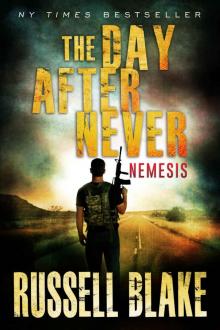 The Day After Never - Nemesis (Post-Apocalyptic Dystopian Thriller - Book 9)
The Day After Never - Nemesis (Post-Apocalyptic Dystopian Thriller - Book 9)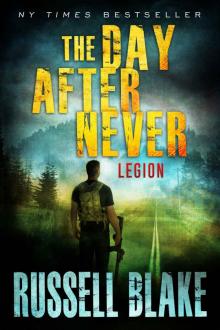 The Day After Never - Legion (Post-Apocalyptic Dystopian Thriller - Book 8)
The Day After Never - Legion (Post-Apocalyptic Dystopian Thriller - Book 8)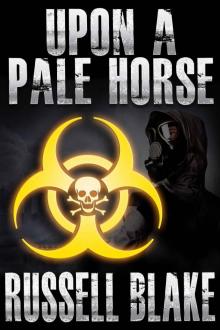 Upon A Pale Horse (Bio-Thriller)
Upon A Pale Horse (Bio-Thriller)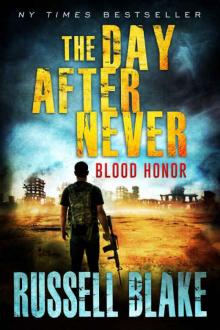 The Day After Never (Book 1): Blood Honor
The Day After Never (Book 1): Blood Honor King of Swords a-1
King of Swords a-1 The Day After Never Bundle (First 4 novels)
The Day After Never Bundle (First 4 novels) Emerald Buddha (Drake Ramsey Book 2)
Emerald Buddha (Drake Ramsey Book 2) BLACK to Reality
BLACK to Reality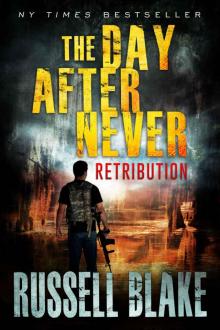 The Day After Never - Retribution (Post-Apocalyptic Dystopian Thriller - Book 4)
The Day After Never - Retribution (Post-Apocalyptic Dystopian Thriller - Book 4) Ramsey's Gold (Drake Ramsey Book 1)
Ramsey's Gold (Drake Ramsey Book 1)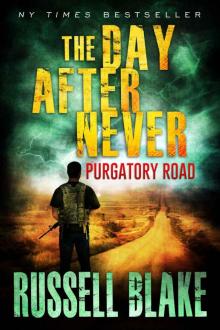 The Day After Never (Book 2): Purgatory Road
The Day After Never (Book 2): Purgatory Road JET - Ops Files
JET - Ops Files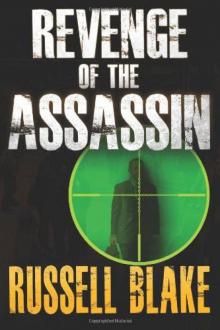 Revenge of the Assassin a-2
Revenge of the Assassin a-2 Requiem for the Assassin - 06
Requiem for the Assassin - 06 The Geronimo Breach
The Geronimo Breach Sahara
Sahara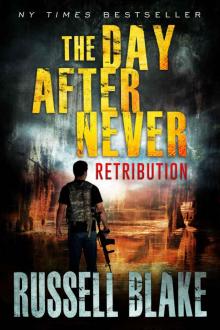 The Day After Never (Book 4): Retribution
The Day After Never (Book 4): Retribution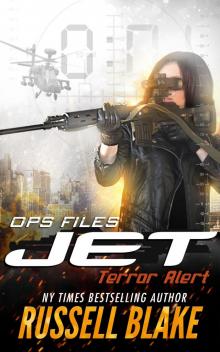 Ops Files II--Terror Alert
Ops Files II--Terror Alert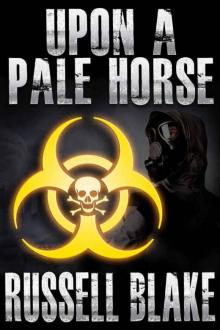 Upon A Pale Horse
Upon A Pale Horse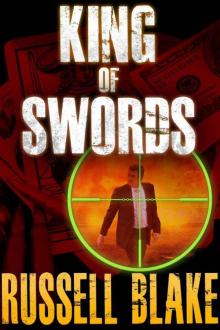 King of Swords (Assassin series #1)
King of Swords (Assassin series #1) A Girl Apart
A Girl Apart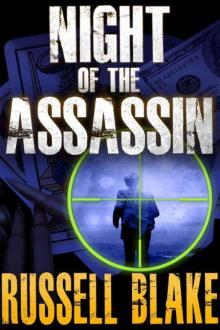 Night of the Assassin: Assassin Series Prequel
Night of the Assassin: Assassin Series Prequel Rage Of The Assassin
Rage Of The Assassin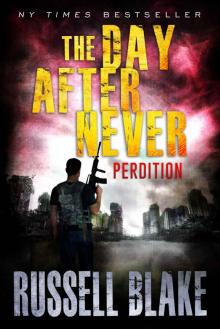 The Day After Never - Perdition (Book 6)
The Day After Never - Perdition (Book 6) The Voynich Cypher
The Voynich Cypher JET, no. 3
JET, no. 3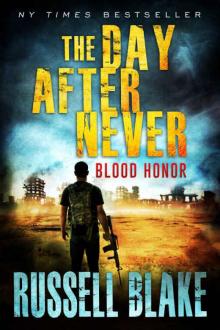 The Day After Never - Blood Honor (Post-Apocalyptic Dystopian Thriller)
The Day After Never - Blood Honor (Post-Apocalyptic Dystopian Thriller) 9 More Killer Thrillers
9 More Killer Thrillers The Goddess Legacy
The Goddess Legacy Fatal Exchange
Fatal Exchange Fatal Exchange (Fatal Series Book 1)
Fatal Exchange (Fatal Series Book 1) JET - Forsaken
JET - Forsaken Black
Black Jet j-1
Jet j-1 Betrayal j-2
Betrayal j-2 Jet 04: Reckoning
Jet 04: Reckoning Jet 03: Vengeance
Jet 03: Vengeance Fatal Deception
Fatal Deception A Girl Betrayed (A Leah Mason suspense thriller Book 2)
A Girl Betrayed (A Leah Mason suspense thriller Book 2)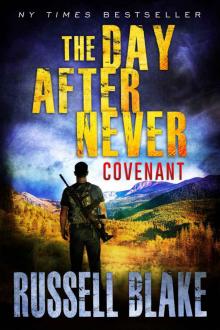 The Day After Never - Covenant (Post-Apocalyptic Dystopian Thriller - Book 3)
The Day After Never - Covenant (Post-Apocalyptic Dystopian Thriller - Book 3) JET II - Betrayal (JET #2)
JET II - Betrayal (JET #2) Zero Sum, Book One, Kotov Syndrome
Zero Sum, Book One, Kotov Syndrome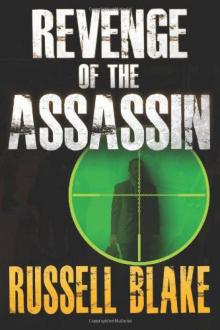 Revenge of the Assassin
Revenge of the Assassin The Day After Never - Insurrection (Book 5)
The Day After Never - Insurrection (Book 5) BLACK in the Box
BLACK in the Box Zero Sum
Zero Sum JET - Escape: (Volume 9)
JET - Escape: (Volume 9) The Manuscript
The Manuscript BLACK Is Back
BLACK Is Back Silver Justice
Silver Justice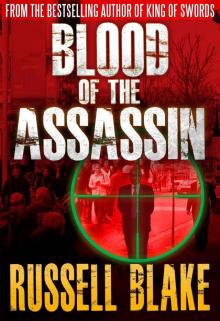 Blood of the Assassin
Blood of the Assassin Rage of the Assassin: (Assassin Series #6)
Rage of the Assassin: (Assassin Series #6) BLACK Is the New Black
BLACK Is the New Black